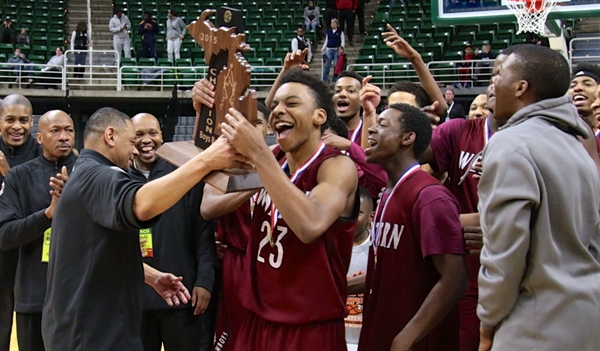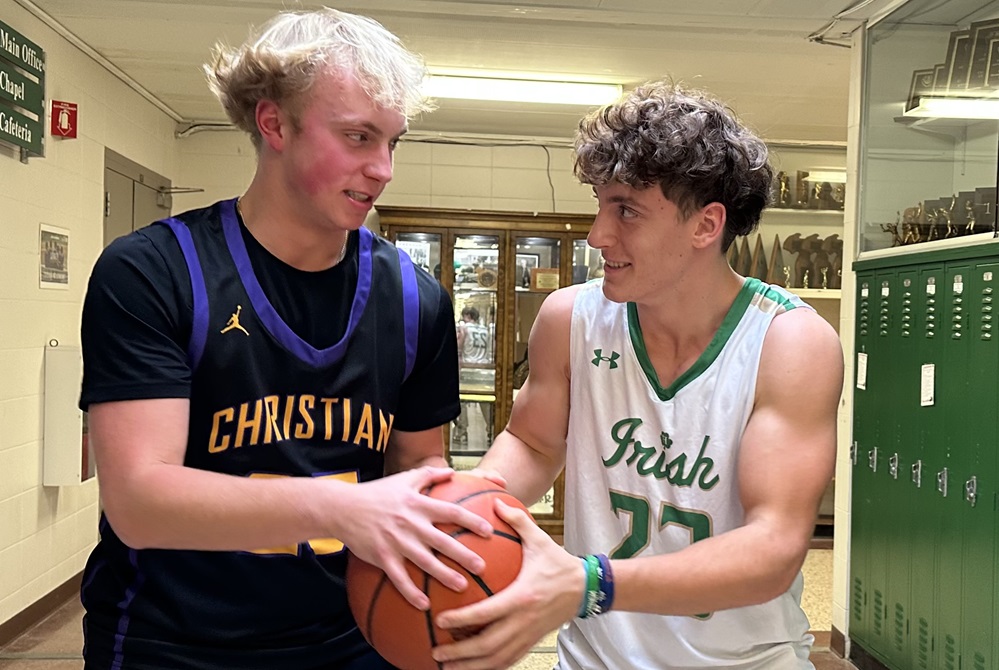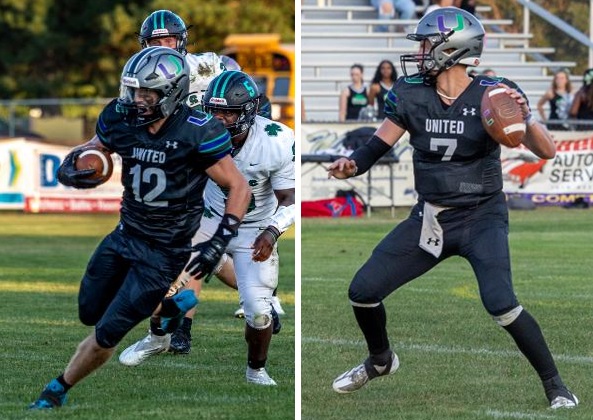
Western Ends Perfect Run with 1st Title
March 28, 2015
By Bill Khan
Special for Second Half
EAST LANSING — Even in their own city, even after all they'd accomplished this season, Detroit Western International's basketball players were somewhat of a curiosity when they showed up at Calihan Hall to play in the MHSAA Class A Quarterfinals on Tuesday.
Western had been this far only twice in its long history — and neither occasion was recent history. The Cowboys reached the Quarterfinals in 1922 and the semifinals in 1974, long before any of the current players were born.
"That's why so many eyebrows were raised," junior guard Brailen Neely said. "When we were at Calihan, they hear Western and they're like, 'Western? They've never had a program.'"
The Cowboys do now — the undisputed No. 1 program in Michigan in 2014-15.
Western completed a perfect season by beating sixth-ranked Saginaw Arthur Hill, 62-59, in the MHSAA Class A championship game Saturday at the Breslin Center.
The Cowboys finished 26-0, including a 69-57 overtime victory over Arthur Hill in their second game. On only five occasions did a team come within single digits of Western. It was the first MHSAA championship in any sport for the school, which was the 1972 Class A runner-up in baseball and had been past the Regionals only five times in bracketed sports.
"It's really big for the community," senior guard Josh McFolley said. "The community hasn't had this in a very long time. It's really big for the school. It's really big for coach (Derrick McDowell) and the team. We've worked hard for this from day one."
Not only has Western historically played in the shadows of Detroit's powerful programs, but the Cowboys were coming off a season in which they gave little indication that they would take the state by storm this winter. Western showed promise two years ago, going 12-7 in McDowell's second season at the school, but the Cowboys slumped to 6-13 last winter.
Even Neely admits he never expected such a dramatic turnaround.
"I thought we would do better, but never state champs," said Neely, who was on the varsity as a freshman.
Neely said the big difference was that the team paid better attention to McDowell, who coached now-defunct Detroit Redford to Class A runner-up finishes in 1997 and 2002.
"It was a process," Neely said. "Our freshman year, we were young and had only one senior. We had a lot of growing to do. Our next year, our 10th-grade year, we thought we had it. We weren't listening. We were knuckleheads, and it showed in our game. We didn't have our best year. People weren't coming to see us, which humbled us. This year, we're on coach Mac's page and he led us to tremendous success."
With sophomore Brian Bowen scoring 10 of his game-high 21 points in the second quarter, Arthur Hill (24-4) grabbed a 25-21 lead heading into halftime.
There were seven lead changes in less than four minutes during the third quarter before Western took the lead for good at 33-32 on two free throws by Neely with 2:28 to go in the period. Those shots ignited what proved to be a decisive 16-2 run, as Western's lead grew to 47-34 with 5:19 remaining in the fourth quarter.
 McFolley overcame an ankle sprain that he sustained before halftime to lead the surge, scoring 10 points during the third quarter. He hit two 3-pointers and scored twice when he stole the ball and went in for layups. He limped noticeably after the game, but showed no signs of the injury during the second half.
McFolley overcame an ankle sprain that he sustained before halftime to lead the surge, scoring 10 points during the third quarter. He hit two 3-pointers and scored twice when he stole the ball and went in for layups. He limped noticeably after the game, but showed no signs of the injury during the second half.
"I knew the adrenaline was going to go through me," McFolley said. "I was going to forget about the pain. It's the biggest game of my career. My team needed me. I had to go back out there."
With Bowen scoring nine fourth-quarter points, the Lumberjacks battled back to within four points twice in the final minute. Nate Moore scored with four seconds left to get Arthur Hill within three, but the Lumberjacks were out of timeouts and Western didn't need to inbound the ball.
"We knew it was going to be tough," McDowell said. "We played them the first time down in Detroit. They were up 13 at the half. The only way we got back in the game was from the defense the first time we played them. At halftime, that was the big emphasis, getting them in the full court, making them work to get down the court. We kind of looked at it like a football field where you have to work to get to the goal line."
Western was led by McFolley with 19 points and Gerald Blackshear with 16 points and 12 rebounds. As transfer students this winter, neither played in the first Arthur Hill game or during their team’s 8-0 start.
"To be honest with you, I knew they were coming, but I had all the pieces anyway," McDowell said. "Those were just extra pieces, I thought. We weren't looking for them to come in and be Superman and Batman and save us. We had enough to win, which showed early in the year when we won without them. What that did was shut up the naysayers who thought the only way we could do it was with those two. We proved them wrong. When they became eligible, it just added to it."
Karim Murray added 15 points for the Cowboys.
Arthur Hill fell short in its bid to win its third MHSAA title to go with championships in 1944 and 2006.
Guard Eric Davis, the Mr. Basketball runner-up, placed the burden for the loss on his shoulders.
"We just missed a couple of opportunities," said Davis, who had 15 points, six rebounds and three assists. "I take full responsibility for today's effort and our loss today. I want to thank my teammates and our coaching staff. They did a great job this year. I take full responsibility. I feel like I didn't step up like I needed to, but I've just got to move on now."
Arthur Hill coach Greg McMath appreciated the show of leadership from his four-year star, but wouldn't let Davis take the blame.
"Like I told Eric (Friday) night, he's a kid who really transformed himself and put the program back where we wanted it to be, because he sacrificed a lot for his team, becoming a point guard and cutting down on his scoring to get everybody else involved to help these guys get better," McMath said. "We're a team. We win as a team; we lose as a team. Him accepting that, we'll take it, but we know it's not his fault, because he gave it everything he had."
Billy Burton had 10 points for Arthur Hill.
Click for the full box score and video from the postgame press conference.
PHOTOS: (Top) Detroit Western International’s Josh McFolley celebrates with his teammates the school’s first MHSAA championship. (Middle) Arthur Hill’s Eric Davis (10) works to get around McFolley.

Kalamazoo United Teammates Personify Program's Friendly Rivalry After Fall is Done
By
Pam Shebest
Special for MHSAA.com
December 17, 2024
KALAMAZOO – Troy Ayotte was cheering on his son, Jack, at Kalamazoo Christian’s rivalry basketball game against Hackett Catholic Prep two weeks ago.
 All of a sudden, he felt conflicted.
All of a sudden, he felt conflicted.
He found himself cheering for a couple of Hackett players.
Ayotte is head football coach of Kalamazoo United, a co-op team with players from both schools.
Three of those players – Keegan McCue, Gavin St. Martin and Elijah Brooks – were now wearing Irish green on the floor.
“I was like, ‘Oh no, (K-Christian) is getting beat, but then you see someone like Keegan or Elijah or Gavin, any of the football players over there and they make a shot and you go, ‘Yes!’” Ayotte said.
 “It’s like, what’s wrong with me? Until you experience it, you don’t know how to explain it. You’re happy for them. They’re playing against kids you coached, and you’re just glad to watch them out there competing.”
“It’s like, what’s wrong with me? Until you experience it, you don’t know how to explain it. You’re happy for them. They’re playing against kids you coached, and you’re just glad to watch them out there competing.”
Besides Jack Ayotte, K-Christian basketball players who also played for United are Jackson Herder, Carter Manion and Chris Daniels.
Hackett won the game, 79-35.
“It wasn’t the way I wanted (the game) to go, but it was fun,” Herder said. “It was fun to see all my football buddies without their helmets and football jerseys, playing another sport they work hard at.”
McCue quickly chimed in, laughing, “I liked the outcome.”
Continuing the bantering, Herder responded, “We’ve got one more game and maybe the postseason, so we’re coming Keeg.”
Being part of the football family in the fall – then rivals by winter – is no big deal, the juniors agreed.
“We go at each other during the (basketball) game, then after the game you’re talking to each other like best friends,” McCue said. “It’s an awesome place to be.”
The friendly rivalry started in eighth grade when United fielded two middle school teams, one for K-Christian players and the other for Hackett.
“We scrimmaged each other every week, and the one time we had an actual game, they beat us for the only time,” Herder said.
“It was fun. Ever since then, we’ve clicked both on the football field and off the football field.”
Clicking is an understatement.
 McCue and Herder led United to a Division 5 Regional Final where the Titans lost to Grand Rapids Catholic Central, 21-14.
McCue and Herder led United to a Division 5 Regional Final where the Titans lost to Grand Rapids Catholic Central, 21-14.
Both players put up monster numbers throughout the season.
Herder, a 6-foot, left-handed quarterback, amassed 2,615 total yards, 2,041 of them passing, with 33 for touchdowns including 28 through the air.
Many of those yards were with McCue, a 5-10 wide receiver who compiled 1,500 all-purpose yards and 16 touchdowns.
McCue not only piled up numbers on offense, but was also proficient on defense. The safety recorded 111 total tackles, many for loss, and snagged four interceptions. He also had six pass breakups, four forced fumbles, three fumble recoveries and two blocked punts.
McCue favors defense because “I love making plays on the ball and tackling people and hitting them hard. It’s so fun.”
Last week he was named Michigan Sports Writers Division 5 first-team all-state.
10-year anniversary
United had a bumpy start 10 years ago trying to combine players from two rival schools into one team.
Both Herder and McCue said they think that being faith-based schools helped the team mesh.
“We pray before every practice, after every practice, before games, after games,” McCue said. “Having that religious aspect to it definitely helps.
“It’s actually really awesome because those guys you don’t see every day during school, but you see then every day during practice during the season and it’s like you don’t go to a different school at all. You’re just family, just brothers, so it’s awesome.”
Troy Ayotte said the biggest challenge for him is answering to two schools.
As for the players, faith is an attribute, the coach said. “They all have common goals.
“Both schools share the same faith-based element, and there are a lot of similarities there. Athletically, both schools stand for the same thing, and that’s excellence.”
Ayotte is not surprised at the success of both Herder and McCue and expects even better things from them next season.
“These two take it upon themselves to become the great athletes they are, and it’s an honor to be on the ride for it,” he said.
 Herder went through his lumps last year and he learned from them, Ayotte said. “That’s the highest compliment. Everybody’s going to fail; it’s how you succeed,” the coach noted. “He really put in the time and the effort and had a great junior year.”
Herder went through his lumps last year and he learned from them, Ayotte said. “That’s the highest compliment. Everybody’s going to fail; it’s how you succeed,” the coach noted. “He really put in the time and the effort and had a great junior year.”
Ayotte said there are other players in the system who want to play quarterback, which is good to keep people sharp.
For now, Herder is atop the depth chart.
“Jackson’s got great moxie and a boatload of confidence,” he said. “Saying he’s confident doesn’t mean he sits higher than the rest of the team. He’s very humble in the way he does it.
“It’s a unique thing. You just know when somebody’s ‘got that,’ the ability to lead but not be too boisterous, just have that nice combination.”
As for McCue, “Keegan brings the thunder,” Ayotte said. “He’s the vocal, he’s king hype. There’s nothing ingenuous at all. It’s not fake.
“What the kids see is the truth in it. Keegan plays with such heart and passion for the game, it’s undeniable.”
With football season over, Herder is translating those skills from the turf to the hardwood.
“I feel like the Lord has blessed me with the ability to lead,” he said. “All the work and dedication that fits that role fits the personality and attitude he gave me.
“It fits with my character and attitude off the field, too. Leader off the field, leader on the field.”
K-Christian basketball coach Seth Dugan appreciates that skill.
“We have seven seniors on our team and Jackson is a captain as a junior, which says a lot about him,” Dugan said.
“He’s good at getting guys in the right spot and sees the floor very well. He’s a natural leader and, as a quarterback, that comes pretty naturally. He puts the team first and is positive and vocal.”
McCue’s leadership on the football field also has carried over.
“He is a competitor who makes his teammates better by pushing them in practice,” Hackett basketball coach Ryan Basler said.
“He is a leader who is not shy to lead by example. I love that he leads our team in prayer many days; this shows his leadership and faith life.”
 Pam Shebest served as a sportswriter at the Kalamazoo Gazette from 1985-2009 after 11 years part-time with the Gazette while teaching French and English at White Pigeon High School. She can be reached at [email protected] with story ideas for Calhoun, Kalamazoo and Van Buren counties.
Pam Shebest served as a sportswriter at the Kalamazoo Gazette from 1985-2009 after 11 years part-time with the Gazette while teaching French and English at White Pigeon High School. She can be reached at [email protected] with story ideas for Calhoun, Kalamazoo and Van Buren counties.
PHOTOS (Top) Kalamazoo United football teammates Jackson Herder and Keegan McCue are rivals during basketball season playing for Hackett Catholic Prep and K-Christian, respectively. (2) United football coach Troy Ayotte. (3) Herder, right, directs the football offense at quarterback against Berrien Springs, with McCue his top receiver advancing the ball. (4) Herder, top, prepares to inbound the basketball, and McCue gets to the hoop against Constantine. (Top photo and headshot by Pam Shebest. Football photos by Kristin Browning. Herder basketball photo by Travis Long, and McCue basketball photo by Chris Ogrin.)

